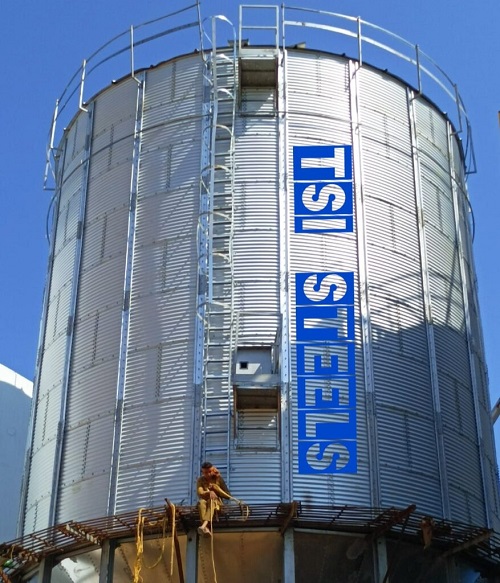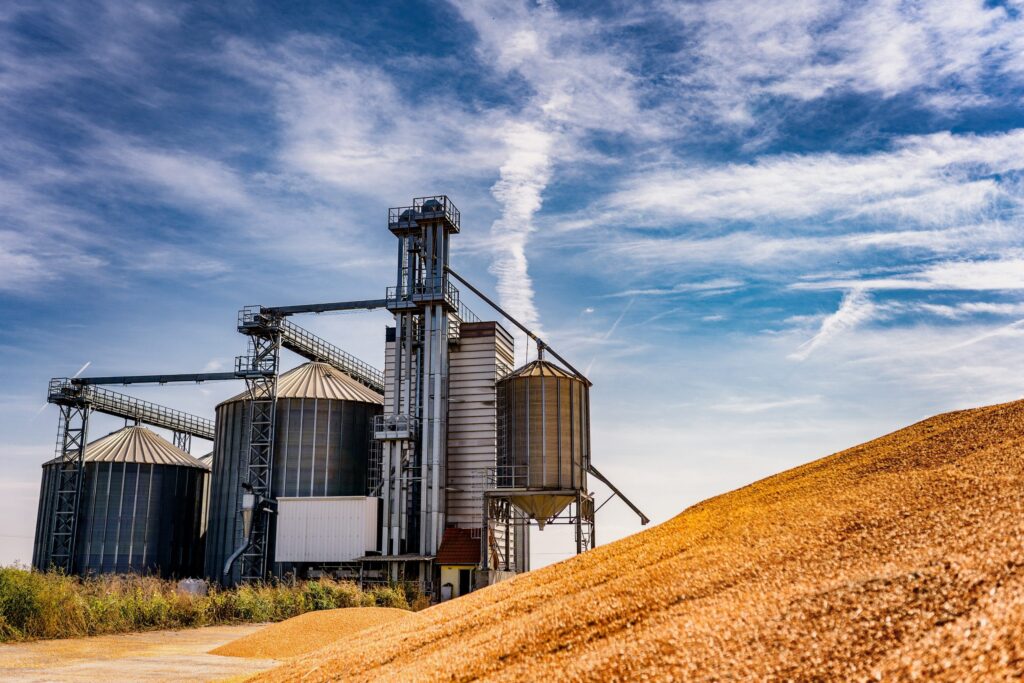What is a Silo? and What is a Grain Silo?
Grain Silo Manufacturer
What is a Silo?
A silo is a large, vertical storage structure used to store bulk materials such as grain, cement, coal, or other agricultural or industrial products. Silos are typically made of steel, concrete, or other durable materials and are designed to hold a large quantity of material in a compact space. Silos are most commonly used in agriculture and industry for storing grains, powders, and other bulk materials until they are needed.
What is a Grain Silo?
A grain silo is a specific type of silo designed to store grains, such as wheat, rice, corn, barley, oats, and other cereals. These silos are crucial for preserving the quality of harvested crops and for providing long-term storage before the grains are processed, packaged, or shipped.
Grain silos are typically cylindrical or conical in shape and are built to allow efficient filling and emptying. They are often equipped with equipment for ventilation, temperature control, and moisture monitoring to prevent spoilage, mold growth, or insect infestations in stored grains.
Uses of Grain Silos
Grain silos serve a variety of purposes in agriculture and the food industry, including:
- Storage of Grains: The primary use of a grain silo is to store harvested grains. It helps maintain the quality of the grains over long periods, preventing spoilage and damage.
- Preservation: Grain silos help preserve the nutritional quality of stored grains by preventing exposure to moisture, pests, and environmental conditions that could degrade them.
- Transportation Hub: Silos act as an intermediate storage facility for grains before they are transported to mills, food processing plants, or other industries for further processing.
- Efficient Handling: Silos allow for the automated filling, monitoring, and emptying of grain, reducing manual labor and improving operational efficiency.
- Bulk Storage for Market Supply: Large quantities of grain are stored to ensure a stable supply of raw materials to the market, especially in times when harvests are not immediately available.
Features of Grain Silos
- Large Capacity: Grain silos are designed to hold large quantities of grains, ranging from a few tons to several thousand tons.
- Ventilation Systems: To ensure proper airflow, grain silos are equipped with ventilation systems that prevent the growth of mold and fungi, which thrive in moist environments.
- Moisture Control: Advanced grain silos come with moisture control systems to maintain an optimal level of humidity, preventing the grains from becoming too dry or too wet.
- Automated Systems: Many modern silos feature automated filling, unloading, and monitoring systems that help with inventory management and reduce manual labor.
- Pest Control: Some grain silos are equipped with fumigation or pest control systems to protect the stored grains from insects and rodents.
- Safety Features: Silos are designed with safety measures, such as emergency exit routes, ladders, and systems to prevent accidents during grain unloading and storage.
Working Principle of Grain Silos
The basic working principle of a grain silo involves storing grain in a controlled environment to maintain its quality and prevent spoilage. Here’s how it works:
- Filling: Grains are poured into the silo through a chute or conveyor system. The silo is designed to distribute the grain evenly to maximize space utilization.
- Ventilation and Aeration: Once inside the silo, air circulation systems maintain airflow around the stored grains. The grains are aerated to prevent heat buildup and mold growth.
- Temperature Monitoring: The temperature inside the silo is carefully monitored using temperature sensors. Grain silos can adjust ventilation to ensure the grains remain at an optimal storage temperature.
- Moisture Control: The moisture content of the grains is continuously monitored. If necessary, systems are activated to adjust the humidity levels to prevent the grain from absorbing too much moisture, which can cause mold, or becoming too dry.
- Storage: The grains remain stored in the silo until they are needed. Modern silos are equipped with automated systems that can track grain inventory levels and prevent spoilage.
- Unloading: When the stored grain is needed for processing, the silo uses a system of conveyors, augers, or gravity to move the grains out of the silo and into transportation vehicles, such as trucks, trains, or ships.
Industries Served by Grain Silos
Grain silos are essential in several industries, particularly those related to agriculture and food processing. Some of the key industries served by grain silos include:
- Agriculture: Grain silos are widely used by farmers and agricultural cooperatives for storing harvested crops like wheat, rice, corn, barley, and oats before they are sold or processed.
- Food Processing: Grain processing mills use silos to store raw grains that are later ground, refined, or processed into various food products like flour, cereal, and animal feed.
- Animal Feed Industry: Grain silos are used to store grains and cereals that are later mixed and processed into feed for livestock and poultry.
- Export and Import: Grain silos are crucial in port facilities where grains are stored temporarily before being shipped to other regions or countries for distribution or processing.
- Bioenergy: Some grain silos are used to store grains that are processed into biofuels, such as ethanol, which can be used as an alternative energy source.
- Beverage Industry: Grains like barley and corn are stored in silos before being used for brewing beer and other alcoholic beverages.
Conclusion
Grain silos are vital storage structures in agriculture and related industries, ensuring the preservation and efficient handling of large quantities of grains. They help protect grains from spoilage, pests, and environmental conditions while also facilitating the smooth movement of grains from harvest to market or processing. With features like aeration, moisture control, and automated systems, grain silos ensure that stored grains maintain their quality until they are needed for various industries, including food processing, bioenergy production, and animal feed.
About TSI STEELS:
TSI STEELS, located in Ghaziabad, Uttar Pradesh, is a leading manufacturer of Grain Storage Silos, Fire Fighting water Tanks, Bolted Tanks, Hopper Bottom Silos, and Flat Bottom Grain Storage Silos. Our standout feature is our 24/7 customer support, ensuring you always have assistance when needed. For inquiries or support, call us at +91-9871665679 or email tsisteels9@gmail.com



Recent Comments